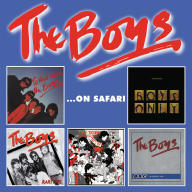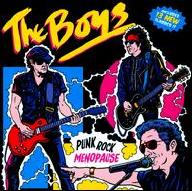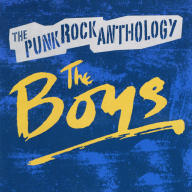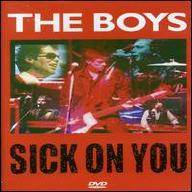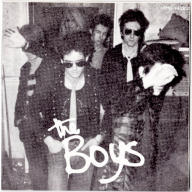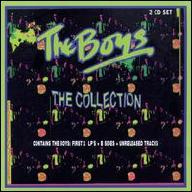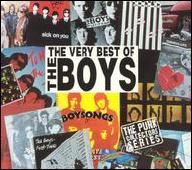Matt Dangerfield and Norwegian-born pianist Casino Steel, rejects of the legendary London SS, linked up with Kid Reid, Jack Black, and John Plain in June 1976. Their directive was simple: to create hard-edged pop music with enough bite to pass the burgeoning punk standards, but enough melody to get by in the mainstream. It says much for their ambition that, within two years, the so-called power pop explosion had grown up almost exclusively around the Boys' frantic majesty.
It was to be a year before the Boys landed a deal, a period during which their reputation soared, and grown men found themselves incapable of resisting the group's cut'n'thrust capering. NEMS adopted the band in spring 1977 and that April brought their first single, "I Don't Care." A carefree anthem of nihilistic cliché, it was an instant alternative chart-topper, but while the band would continue to dominate the indie lists, the Boys never landed the national hit they deserved. Thus "First Time," in July, flopped ignominiously and, in November, the Boys' eponymous debut album -- recorded, incidentally, in just two days -- all but went the same way. One week at number 50 is not the stuff from which dreams are made, after all.
Christmas brought the first of the band's annual transmogrifications into the Yobs, and the appearance of the seasonal "Run Rudolph Run" 45. Then it was back to the clubs and, in the spring, the recording studio. The band's second album, Alternative Chartbusters, was previewed by "Brickfield Nights," the first new Boys single in six months, and immediately it was apparent that things had changed appreciably while the band had been away. Their European profile had grown immeasurably, and northern Europe, at least, treated them like long-lost sons. Boysmania swept Holland, while graffiti peppered walls in Norway. Still largely overlooked in their homeland, the Boys went into 1979 on the verge of Continental superstardom, only for their plans to sustain a major blow when they parted company with NEMS early into the recording of their third album.
Eighteen months elapsed before the band resurfaced, a period broken only by Steel and Chamberlain's partnership with the Scandinavian porn star Christine X for her eponymous album, and Plain's temporary membership in the Lurkers. Finally, however, the Boys signed with Safari, scrapped the original album sessions (they were finally released as The Original to Hell with the Boys in 1990), and traveled to Trondheim, Norway, to begin again with producer Bjorn Nesside. To Hell with the Boys appeared in October 1979, and the Boys launched a British tour opening for the Ramones. A DVD of one performance on this tour was released in 2006 as Sick on You.
The Boys' next European outing, meanwhile, spawned the erroneously titled Live at the Roxy Club album; in fact, the disc was recorded in France in 1980. Unfortunately, the Boys' European profile still wasn't translating at home. Two new singles, "Kamikaze" and "Terminal Love," together with a riotously rude Yobs Christmas album, flopped, and as 1980 dragged on, it became clear that the Boys were losing hope. Finally, Steel took the advice of the band's most recent single, a cover of the old Arthur Alexander soul chestnut "You Better Move On," and quit.
He was replaced by former X-Ray Spex saxophonist Rudi, but neither the ensuing Boys Only album nor the "Weekend" and "Let It Rain" singles performed well, and by March 1981 Reid too had quit. He was replaced by Lurkers vocalist Howard Wall for the band's next (sold-out) Italian tour, and the band scratched out one final single, "Woch Woch Woch," before folding toward the end of 1981. Dangerfield moved into production before forming a new band, the Mirrors. Steel returned to Norway, working with a succession of bands before reuniting with Plain in Ian Hunter's Dirty Laundry in 1996 -- Plain and Black were also members of the New Guitars with ex-Lurker Pete Stride.
As with so many bands of their era, it took the attentions of Die Toten Hosen to bring the Boys back together, after the Germans took on "First Time" for their Learning English album. In 1996, Steel, Plain, Reid, and Dangerfield linked with the German band's vocalist, Campino, for an unplugged best-of collection, Power Cut. Two years later, Japanese band Michelle Gun Elephant scored a pair of homeland hits with covers of "Soda Pressing" and "Sick on You." Of course the original band was asked to re-form, and in July 1998 the same quartet of Boys, plus drummer Steve Vom Ritchie (replacing Jack Black), played two sold-out shows in Tokyo.
Another two years later, they were together again at a punk festival in Bergara, Spain, and, in July 2001, the Boys' first U.K. gig in 20 years saw them headline the Holidays in the Sun festival. The Boys rounded out the year by joining with former Adverts frontman TV Smith to co-headline a show in Dusseldorf, Germany. Footage of the Boys' set completes the aforementioned Sick on You DVD. This same lineup then stayed together long enough to record and release a new single. Dedicated to the newly employed England soccer manager Sven Goran Eriksson, "Svengerland" was issued by Captain Oi! within that label's magnificent series of Boys reissues and compilations. All four regular albums have been repackaged with bonus tracks, alongside a reissue of The Original to Hell with the Boys; other collections include a gathering of their BBC sessions and several "best-of" compilations.
A reunion in September 2006 included a London show marking the 30th anniversary of the Boys' first-ever gig at Islington's Hope and Anchor, and the group continued to tour periodically in the U.K. and Europe, even playing a festival date in Canada in 2011. In 2012, a lineup anchored by Dangerfield, Steel, and Plain convened in France to begin work on a new album; in July 2014, the long-awaited long-player finally emerged under the title Punk Rock Menopause, three months after the Boys headlined the Hozac Blackout Fest in Chicago, which was only their fourth live appearance in the United States.
A lot has changed since that first show, musically, culturally, and socially. But one thing is for certain: the sound of the Boys themselves remains as invigorating today as it was back then. ~ Dave Thompson, Rovi


